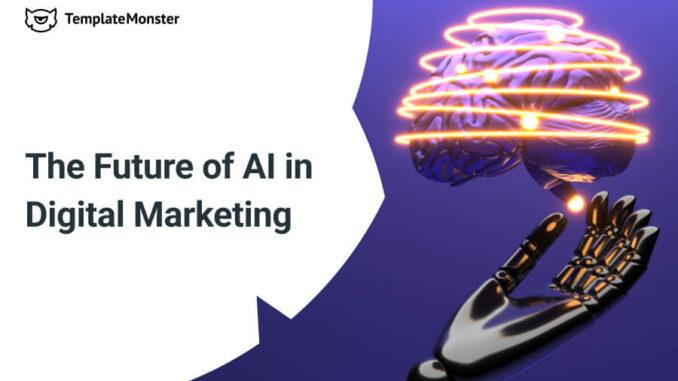
The field of Internet advertising is undergoing a sea change as a result of the advent of artificial intelligence. From customer profiling to targeted communications, AI in digital marketing has the potential to completely transform the advertising sector. Machine learning’s ability to sift through mountains of data and draw conclusions about consumer habits makes it a must-have for marketers soon.
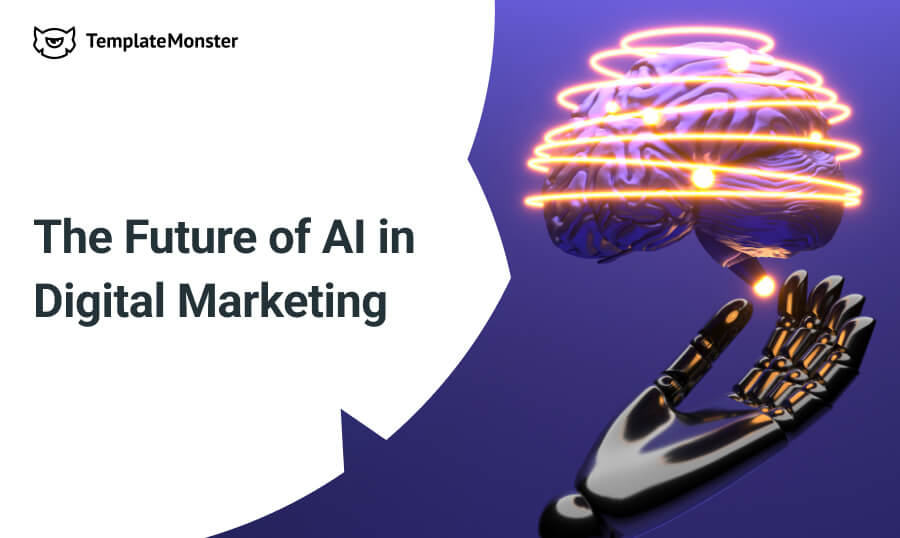
During the period 2020–2025, the artificial intelligence market is expected to grow by $76.44 billion. It is fascinating to see how AI’s ongoing development affects the future of web advertising and the opportunities it creates for forward-thinking businesses.
This article discusses some of the trends and predictions that are shaping the coming years for AI in digital marketing. We’ll also talk about how businesses can use machine learning to enhance their marketing efforts and more effectively communicate with their target audience.
What is AI in Digital Marketing & How it Can Boost Your Startup
Automation of routine tasks, customization of the user experience, and improved ad targeting are all possible thanks to AI. Therefore, it aids companies in reducing expenses, reaching a wider audience, and earning more money.
Here are a few concrete cases where intelligence was used in digital marketing:
- Process automation. Managing your social media accounts, emails, and content creation.
- Personalization. Customer-specific content creation. Buyers are more likely to engage with and purchase from you if the material they see is tailored specifically to them.
- Relevant ads. Smart and precise advertising targeting. This paves the way for the creation of relevant advertisements that are more likely to be noticed and engaged with.
- Lead generation. Finding prospective buyers who might be interested in a company’s goods or services and turning them into leads.
- Website optimization. Making a website more visible in search engine results by evaluating its content and structure.
- Data analysis. Making informed company choices and enhancing advertising tactics through analyzing data.
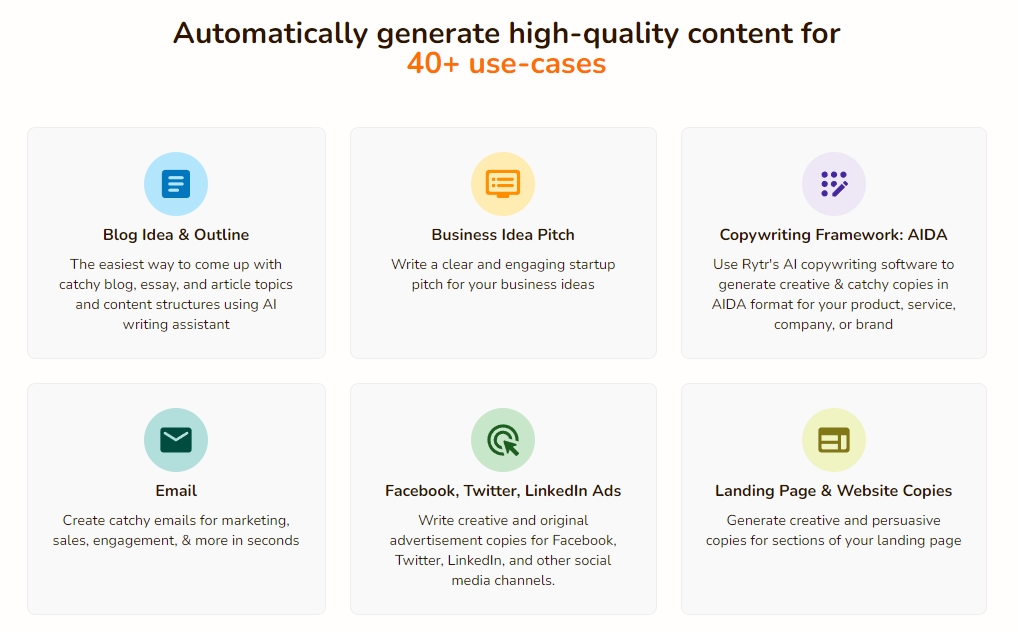
The above demonstrates the versatility of AI in digital marketing. Some of the concrete applications include:
Content Writing
Artificial intelligence software is able to create engaging content tailored to specific demographics. Simply provide the tool, like Rytr or Writesonic, with information about your topic and target audience (age range, hobbies, etc.). The tool uses this data to produce content that is more likely to resonate with your intended market.
Customer Service
Automated intelligence assists in providing timely responses to consumer queries and problems. To accomplish this, site owners use AI-powered chatbots or virtual assistants like Echowin and Tiledesk. Automated assistants can resolve issues like order tracking and returns, and you can train them to answer frequently asked questions.
Email Management
Personalizing email campaigns with AI tools (e.g., Hoppy Copy and ChatGPT Writer) helps increase open and click-through rates. Consumer behavior analysis assists in categorizing a clientele. Then, for each subset, AI composes the email’s headline and body copy. By automating your email marketing strategy, you’re able to reach prospects when it is most convenient for them, resulting in higher CTRs.
Social Networking
There has been an increase in the use of AI tactics on social media, such as pre-programmed replies and content curation tailored to individual users’ preferences. These increase exposure, which encourages brand creativity and allows them to reach a wider audience. This also leads to greater effectiveness when targeting the right audience segment or influencer channels. For example, try Adcreative to see what we mean.
Image and Video Editing and Production
High-quality imagery for advertising campaigns is now within reach, thanks to AI-powered tools. Fliki and DallE-2 are two tools that generate visual content following your brand’s guidelines and product specifications. To improve your visuals even further, use Erase and Gling, two editing tools that remove distracting backgrounds and add effects, respectively.
How AI Revolutionizes Customer Segmentation & Targeting
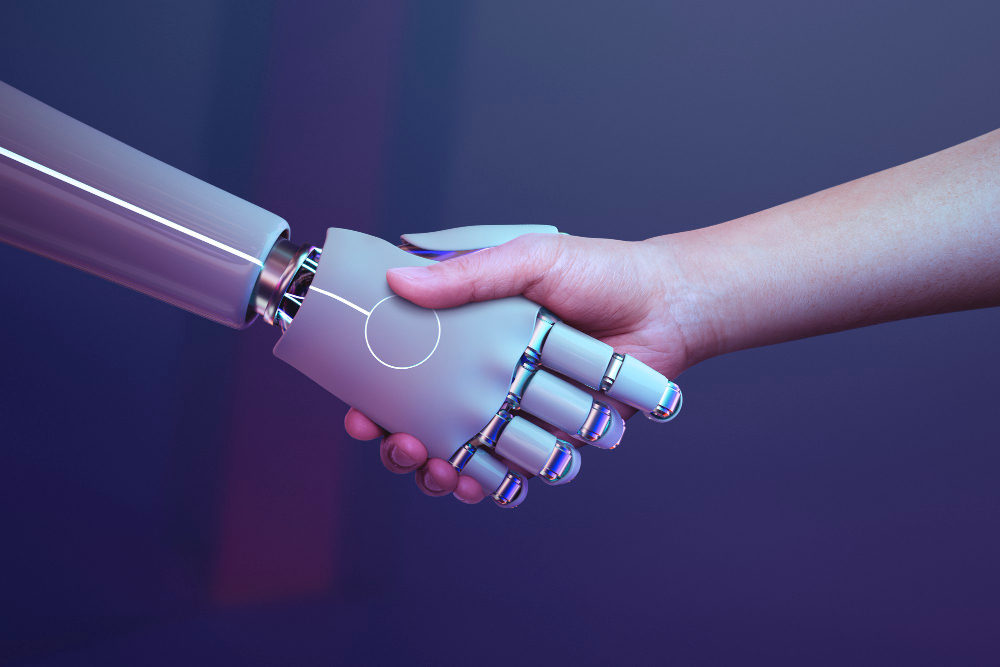
What does the near future hold for AI in digital marketing? These are some possible predictions and future paths:
- As artificial intelligence persists in automating routine tasks, marketers will have additional time to focus on planning and strategy.
- This cutting-edge technology is designed to create a more personalized and engaging experience for your audience.
- It also allows you to pinpoint specific demographics with accuracy and measure the success of promotional initiatives launched by the brand.
- Moreover, this data will also inform innovative advertising strategies that are sure to drive greater revenue streams in the future.
Let’s start with the basics and work our way up.
Increasing Sales through VR/AR
In the future, AI-driven tools for driving revenue through VR and AR may include personalized shopping experiences with automated purchasing advice tailored to individual preferences. They could also provide promotional offers and discounts based on customer behavior and purchasing habits. They also give shoppers a more immersive shopping experience by allowing virtual product walkthroughs or try-on. This has the potential to increase sales as well as satisfaction among consumers.
Improving Shopping Experience
AI-specific tools for the future of shopping are nearly limitless. Companies will be able to personalize product recommendations while understanding client preferences such as interests, budgets, and previous purchases. Buyers could also have a more interactive experience with virtual sales assistants who can assist them in quickly and easily understanding their needs when searching online or in-store.
With ever-improving artificially intelligent systems, consumers can expect a faster checkout process with fewer manual checks and payments, as well as secure data security measures built into all transactions.
Automating Tasks and Improving Efficiency
Machine learning is a way to streamline operations such as order processing, inventory management, and client service. Sales are going to benefit from automated solutions that optimize product availability and pricing based on customer preferences or market trends. Personalized recommendations tailored to each client could help improve existing interactions with consumers while attracting new ones. Retailers will be able to provide an enhanced shopping experience at every touchpoint of the purchase journey by utilizing these powerful tools.
Improving Your Decisions
Data analysis is one of the areas where machine learning could be useful in the future. Pricing, product placement, and advertising campaigns, for example, can all benefit from this. This could potentially help corporations increase their profits.
How Conversational Interfaces and Chatbots are Transforming the Client Service Industry
Customer service, advertising, and education are just a few of the industries that use chatbots. According to experts, highly intelligent chatbots have the potential to boost productivity by up to 40%. Virtual assistants are expected to become more advanced as technology advances, providing a more personalized and convenient experience for those looking for solutions.
This technology has a variety of business applications, including basic task-based bots and advanced conversation assistants powered by natural language processing (NLP). As they continue to evolve, chatbots have been able to provide more personalized assistance, giving users a unique experience. Equally important, they help companies complete mundane tasks without human intervention, enabling them to focus on more pressing matters.
Nevertheless, chatbots are capable of revolutionizing the way companies operate by offering a multitude of potential benefits. In particular, they have the potential to:
- comprehend human language to react accordingly and expand their capabilities over time;
- continuously improve business procedures through automated programs;
- deliver personalized service for shoppers across various channels;
- learn new skills and adapt as needed to AI-driven technology like virtual reality and personal assistants;
- provide efficient solutions to customer satisfaction and introduce innovative ways of communication.
Using AI in Digital Marketing for Deeper User Behavior Analysis
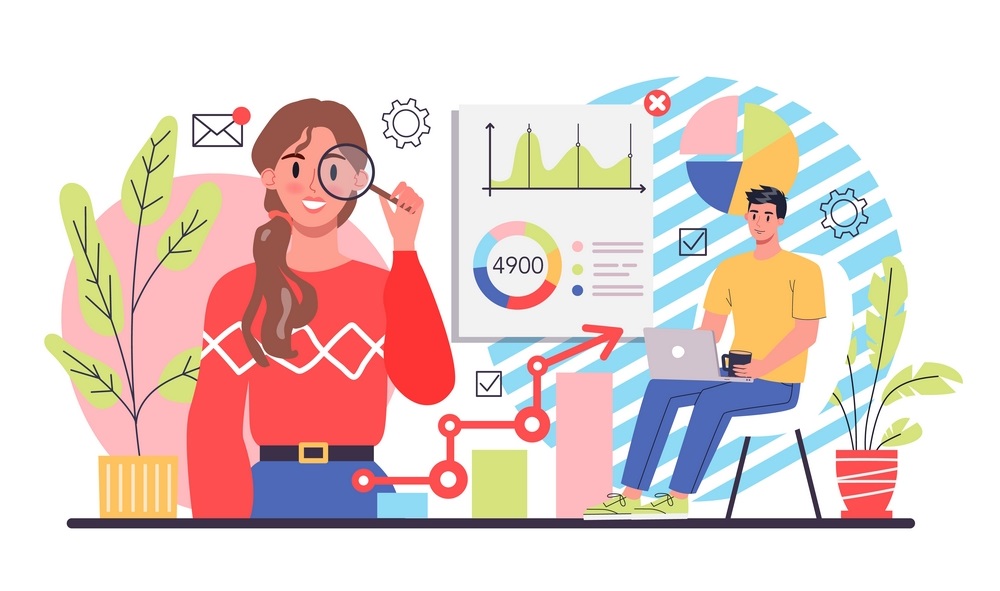
Process optimization concept. The idea of business improvement and development. Company data analysis. Effective entrepreneurship organization. Isolated flat vector illustration
Machine learning is revolutionizing the digital marketing industry. By analyzing user data, marketers can gain valuable insights into consumer behavior that allow them to optimize future campaigns. Moreover, these technologies enable more precise targeting by understanding audience demographics and interests for a greater investment return. In fact, seventy-five percent of CEOs believe machine learning will help their company enter new markets, and 83 percent say AI development is already a top strategic priority. So to stay ahead of your competitors, now is the perfect time to invest in artificial intelligence to enhance your online marketing campaigns.
Additionally, AI in digital marketing has practical applications such as:
- Monitoring how people interact with digital advertisements, including how frequently, for how long, and from where they click. Marketers use this information to fine-tune their campaigns for the best results.
- Creating subsets of users who share characteristics (such as age, gender, and interests) to enhance targeted ads.
- Estimating which users of a digital platform are most likely to interact with a given ad, thus boosting the ROI of the campaign.
- Considering how digital marketing campaigns affect audience engagement, traffic, and bottom-line results.
How Might Things Change?
Marketers are likely to be able to better understand user behavior and calculate return on investment (ROI) with the help of artificial intelligence soon.
- AI-powered solutions will provide a comprehensive picture of users’ online behavior, paving the way for highly specific, personalized marketing campaigns.
- Marketers will be able to better identify prospects who are likely to convert based on historical trends in data points such as demographics or product preferences with enhanced predictive analytics.
- Furthermore, businesses will have access to sophisticated attribution models that track consumer actions across multiple channels and allocate performance metrics accordingly. This will assist businesses in making informed decisions about how to best spend their budget to maximize ROI.
To summarize, incorporating advanced artificial intelligence technologies into the digital ecosystem is becoming increasingly important in enabling today’s business owners to closely monitor their clientele while intelligently maximizing their investments.
Wrapping Up
When it comes to promoting websites and online stores, AI in digital marketing could be a game changer. Companies use artificial intelligence to better understand their customers, automate everyday operations, and come up with innovative solutions to problems. Businesses will benefit from increased sales, client satisfaction, and lower operating expenses. Businesses that employ deep learning, in particular, can improve customer experience, ad targeting, and campaign measurement.
Artificial intelligence is the wave of the future in digital advertising, and those who resist it will be left behind.
FAQ: The Future of AI in Digital Marketing
AI plays a crucial role in digital marketing by automating tasks, analyzing data for insights, personalizing customer experiences, and optimizing marketing campaigns for improved efficiency.
Emerging trends in AI for digital marketing include hyper-personalization through data analysis, the rise of voice search and chatbots for real-time customer interactions, predictive analytics for data-driven decision-making, visual search for enhanced product discovery, and automated content generation for efficiency.
AI will impact digital marketing strategies by enabling precise targeting, delivering personalized customer experiences, automating repetitive tasks for efficiency, and providing real-time insights for faster decision-making.
Data privacy and security concerns, ensuring ethical use of AI to avoid biases and discrimination, skills gaps for successful implementation, and maintaining a balance between technology and human creativity are challenges with AI adoption in digital marketing.
The post The Future of AI in Digital Marketing: Trends and Predictions appeared first on MonstersPost.

Leave a Reply